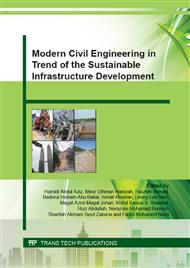[1]
N. Abdul Wahid, I. Abustan, Z. Abas and R. Arshad, Drinking water for public consumption: the call for a socio-economic cost analysis, AWERProcedia Advances in Applied Sciences. 1: 425-431 (2013).
Google Scholar
[2]
N. Abdul Wahid, Z. A. Ahmad and R. Arshad, Water services reform in malaysia: legislative issue, Journal of Natural Resources and Development, 4, (2014), pp.64-64.
DOI: 10.5027/jnrd.v4i0.09
Google Scholar
[3]
Y. K. Cheong, National Water Services Commission (SPAN) and Full Cost Recovery of Drinking Water Issue – A Case Study, unpublished MBA thesis, GSB, USM (2014).
Google Scholar
[4]
C. Y. Kheong. The Water Tablet Malaysian Water Reforms: Ministry of Energy, Water and Communications, Malaysia, (2008).
Google Scholar
[5]
S. M. Shahabudin, , Restructuring Water Services In Malaysia. The Ingenieur, 28, (2006), 95-97.
Google Scholar
[6]
M. Pigeon, Chapter Six - Soggy Politic Making Water Public in Malaysia, in: M. Pigeon, D.A. McDonald, O. Hoedeman, S. Kishimoto (Eds. ), Remunicipalisation: Putting Water Back into Public Hands. Transnational Institute. 2012, Information on http: /www. municipalservicesproject. org/publication/remunicipalisation-putting-water-back-public-hands#sthash. qG3gnAg2. dpuf.
Google Scholar
[7]
N. Abdul Wahid, Z. A. Ahmad, R. Arshad, Y.K. Cheong, and I. Abustan, Water services reform issues in Malaysia – a review, The 1st. National Conference on Non-point Source Pollutions Proceedings, 14-15 May, Vivatel Hotel, Kuala Lumpur, Malaysia, (2014).
Google Scholar
[8]
K. H. Chew, Factors Influencing Malaysian Household's Willingness to Pay for Water Consumption: Penang and Perak, unpublished MBA thesis, GSB, USM, (2014).
Google Scholar
[9]
E. Roth, Water pricing in the EU: a review. The European Environmental Bureau Publication Number 2001/002, Brussels, (2001).
Google Scholar
[10]
W. M. Z. Wan Ismail, Optimization of water supply system: kelantan case study on riverbank filtration system (RBF). Powerpoint presentation, Leadership Forum [East-West experience Sharing] A platform for experience sharing to enhance the sustainability of water services to the people. Borneo Water and Wastewater Exhibition 2012, 27-29th November, Pullman Hotel, Kuching, Sarawak, (2012).
Google Scholar
[11]
O. Beaumais, A. Briand, K. Millock, and C. Nauges, What are households willing to pay for better tap water quality? A cross-country valuation study, 1-37 (2010).
DOI: 10.2139/ssrn.2407873
Google Scholar
[12]
Y. Jiang, L. Jin, and T. Lin, Higher water tariffs for less river pollution-evidence from Min River and Fuzhou City, People's Republic of China. Philippines (2010).
DOI: 10.2139/ssrn.1633343
Google Scholar
[13]
S. Behailu, A. Kume and B. Desalegn, Household's willingness to pay for improved water service : a case study in Shebedino District, Southern Ethiopia. Water and Environmental Journal, (2012), 1-6.
DOI: 10.1111/j.1747-6593.2012.00320.x
Google Scholar
[14]
H. Khan, F. Iqbal, I. Saeed, and I. Khan, Estimating willingness to pay for improvements in drinking water quality: Evidence from Peshawar, Northern Pakistan. Environmental Economics, 1(2), (2010), 38-43.
Google Scholar
[15]
Y. Cho, K.W. Easter, L.M.J. McCann, and F. Homans, Are rural residents willing to pay enough to improve drinking water quality? Journal of The American Water Resources Association, 41(3), (2005), 729-740.
DOI: 10.1111/j.1752-1688.2005.tb03767.x
Google Scholar
[16]
M. Genius, E. Hatzaki, E.M. Kouromichelaki, G. Kouvakis, S. Nikiforaki and K.P. Tsagarakis, Evaluating consumers' willingness to pay for improved potable water quality and quantity. Water Resource Management, 22, (2008), 1825-1834.
DOI: 10.1007/s11269-008-9255-7
Google Scholar
[17]
M. Kamaludin, K.A. Rahim, A. Adam and M. R. Yacob, Improvements in domestic water services in Kelantan: are people willing to pay?, Journal of Sustainable Science and Management, 8(2), (2013), 197-206.
Google Scholar


